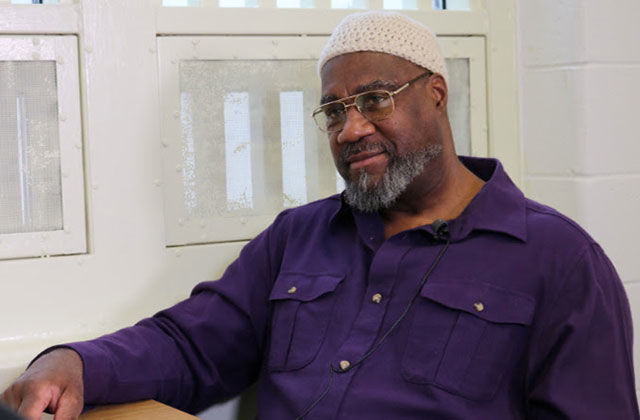The COVID-19 Pandemic crisis has revealed the costs of US militarism and the system of mass incarceration under which the US has five percent or less of the world’s population, yet 25% or more of the world’s prisoners, not even counting immigrants, refugees and asylum seekers being held in detention. Prisons have become a hot-bed of coronavirus infections, not only among the prisoners themselves but all guards and other personnel working in the dungeons.
The US has also sought to use military measures against other countries and their efforts to fight the infection, such as the sanctions against Cuba, Venezuela and Iran. And the military itself has also been impacted with vessels in the Navy particularly at risk.
Political Prisoner Gets COVID As NY State Appeals His Court-Ordered Release

Jalil Muntaqim (Anthony Bottom) is a Black elder and former member of the Black Panther Party who has been in prison since 1971. He had been experiencing early symptoms of COVID-19 over the last few days and was tested by staff at Sullivan Correctional Facility in New York.
On Monday, May 25, his fever increased and a positive test result caused his transfer to an Albany hospital. Jalil’s current health crisis is a clear indication that he needs to be released from custody as soon as possible. Absent release, his parole-eligible sentence can become a death sentence.
A writ of habeas corpus on behalf of Jalil requesting relief based on his heightened vulnerability to contract the virus was filed on Monday, April 13. On April 27, Judge Schick in Sullivan County granted Jalil Muntaqim’s release. But New York Attorney General Letitia James appealed the judge’s decision, preventing Jalil’s release.
On April 30, the members of the New York State Black, Puerto Rican, Hispanic and Asian Legislative Caucus wrote Attorney General Letitia James in support of the recent court ruling granting the temporary release of Jalil Muntaqim from custody:
“We are certain you are aware that numerous doctors and public health experts have publicly concluded that the only way to manage the risk to incarcerated populations posed by this virus is to rapidly and decisively release the most vulnerable populations who are at the highest risk. And unfortunately, COVID-19 has already entered the New York State prison.
“The caucus has previously appealed to the governor in support of Mr. Bottom’s (Jalil’s) clemency application last year. With the advent of this pandemic, it is ever more apparent that it is time to allow for his safe transition back into society.
“This is precisely the correct moment to act – before there are exponentially-increasing numbers of cases of COVID-19 in prisons and no way to care for people. The state has an obligation to afford adequate medical care and livable conditions of confinement in its prison system. As the virus continues to spread in the prisons, there will be no way to do that, creating a looming legal and moral liability.”
Despite the caucus’ intervention and Judge Schick’s decision to release him, Jalil has remained in custody and is now suffering from COVID-19 with great risk to his life.
Despite the intervention of the New York State Black, Puerto Rican, Hispanic and Asian Legislative Caucus and Judge Schick’s decision to release him, Jalil has remained in custody and is now suffering from COVID-19 with great risk to his life.
The United States has the highest number of coronavirus-related deaths in the world. New York State is the epicenter with the highest number of cases and mortalities.
Within that, jails and prisoners under New York State’s Department of Corrections are the epicenters within the epicenter. There are already 492 confirmed cases among incarcerated people and 1,270 among staff in the state prisons (these numbers do not include Rikers Island and other jails). Given the lack of widespread testing and the rampant asymptomatic spread, the numbers of people actually infected are likely much higher.
Roughly 43,000 people – most of whom are Black and Latinx people – are incarcerated in New York State’s prison system; of these, 9,550 are older adults, and many are health compromised. It is impossible for prisons to comply with CDC recommendations on hygiene and social distancing and there are already 11 confirmed COVID-related deaths of older people in New York prisons since the beginning of April.
The continued confinement of older and/or health compromised prisoners fuels the pandemic, not only among incarcerated people but also in the communities where prison staff live.
Jalil Muntaqim’s release is a public health imperative.
Jalil’s release works in the interest of public health, including the health and safety of all New Yorkers.
The release of an older and medically vulnerable person from prison is a public health intervention consistent with the recommendations of medical and public health experts, legal and academic organizations, and faith community leaders and criminal justice researchers. Experts agree that prisons cannot provide protection from COVID-19 infection and that older incarcerated people and others with underlying conditions are in grave danger.
Jalil falls squarely in the categories listed by the Centers for Disease Control as having the highest risk. He is over 65 and suffers from hypertension, which resulted in a stroke several years ago, as well as from several chronic respiratory ailments. Not only is his release consistent with the recommendations of public health experts, but all other imprisoned New Yorkers with similar vulnerabilities should also be released.
As news outlets have reported, some – though far from enough – similarly-situated individuals have been released from immigration detention, local jails and federal prison due to their heightened vulnerability to COVID-19. Where prison administrators, governors and others in power have refused to release vulnerable people, courts are rightly recognizing that immediate release is a life-saving intervention and that the pandemic is an unprecedented challenge for the criminal legal system.
It is time for Jalil Muntaqim to come home to his family and his community!
